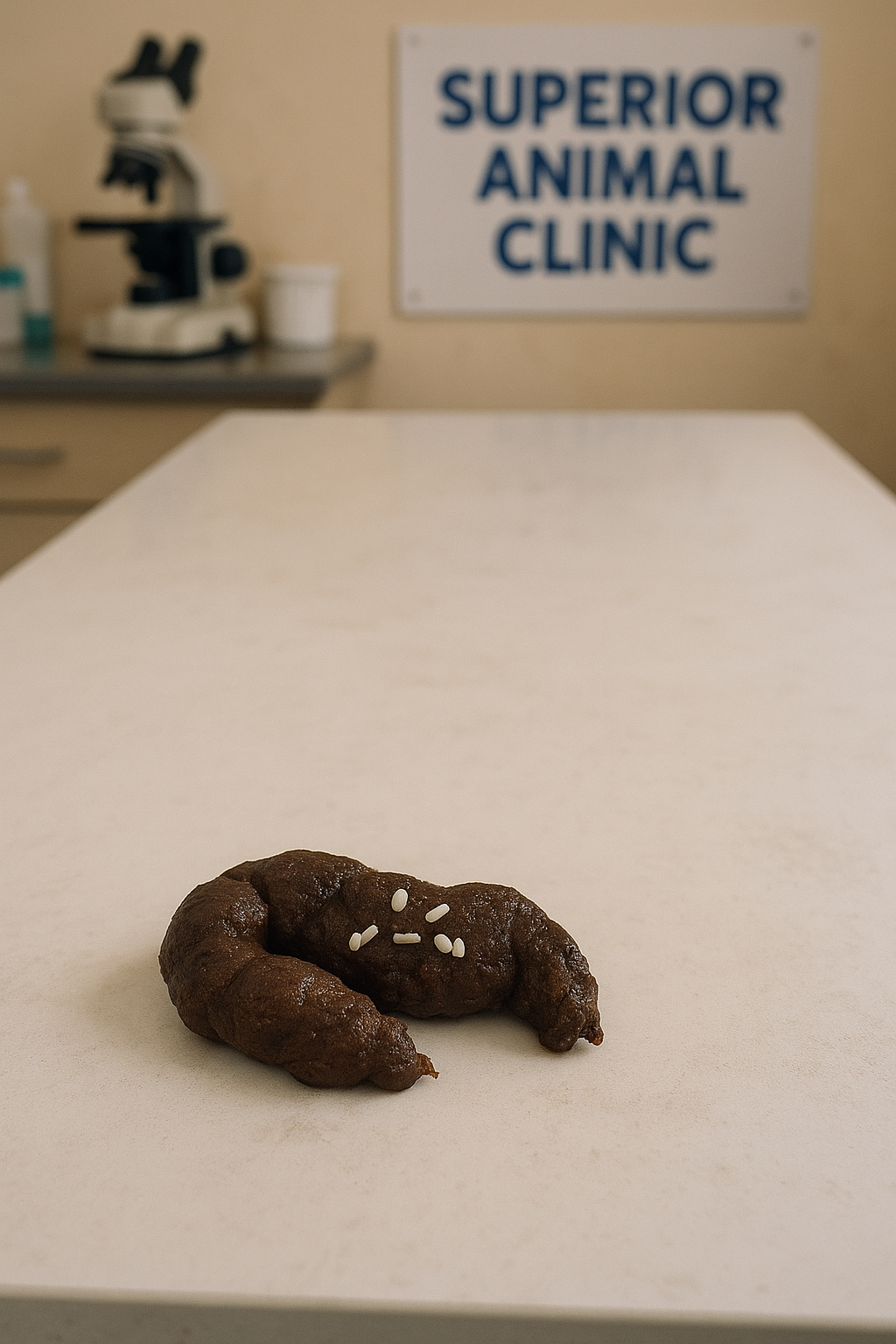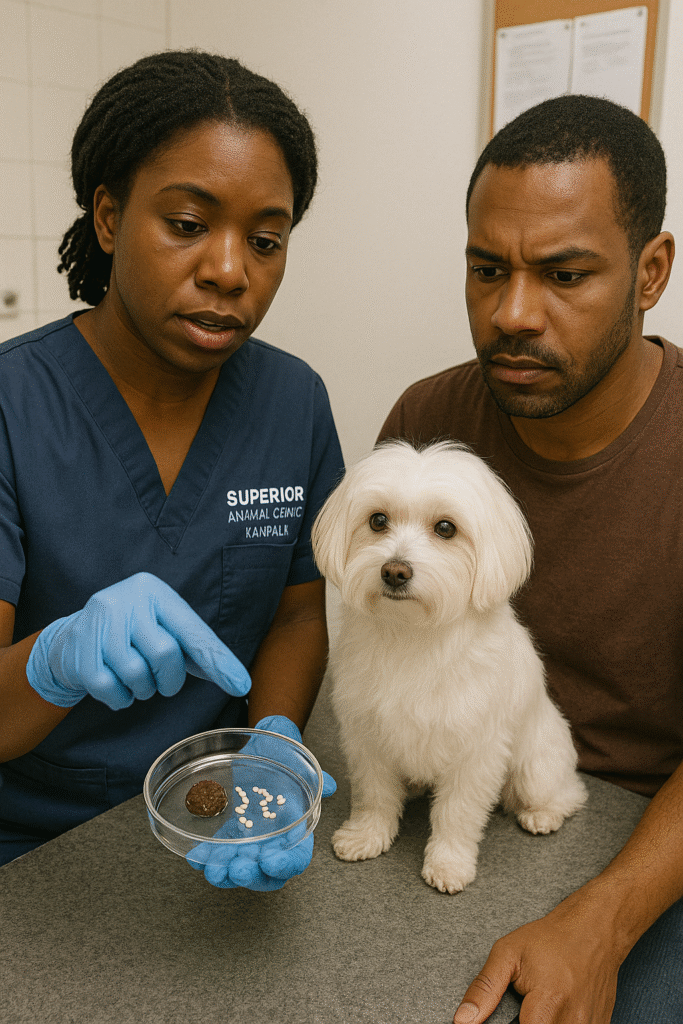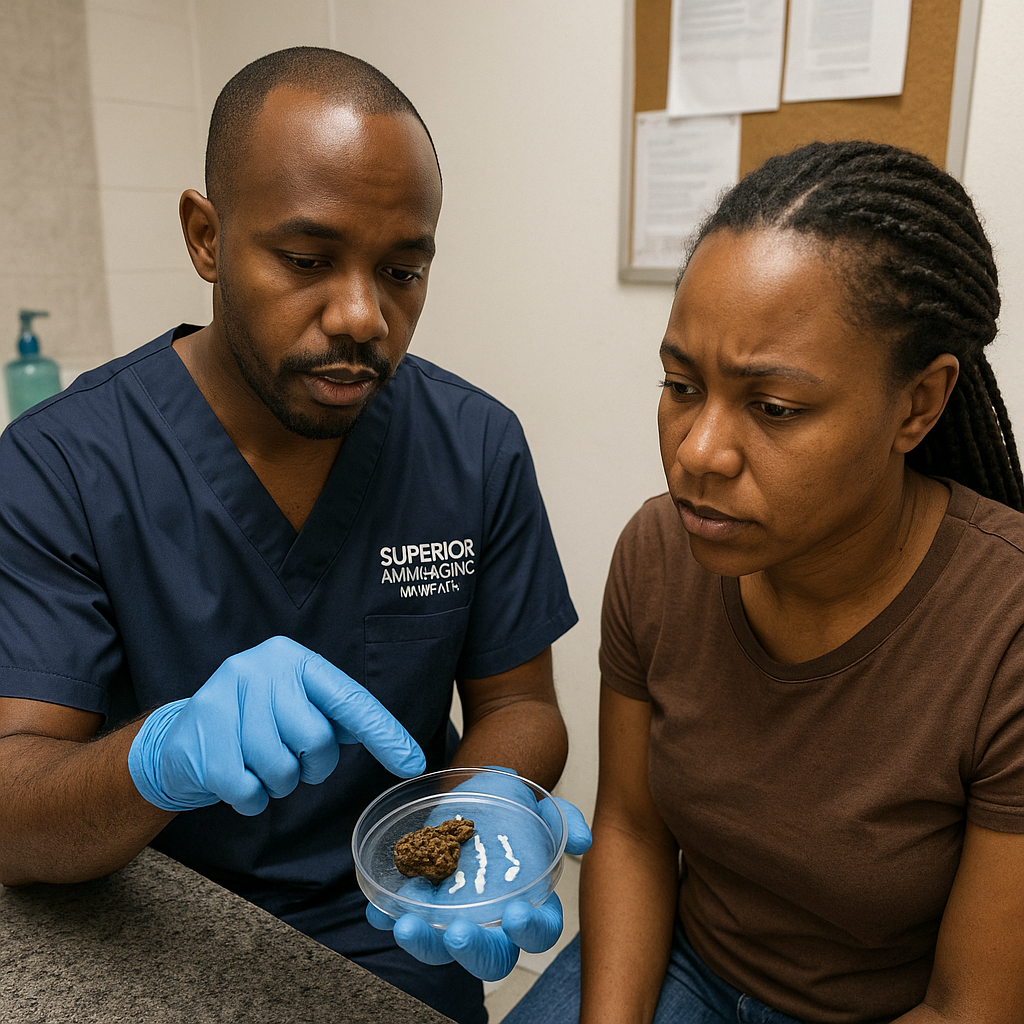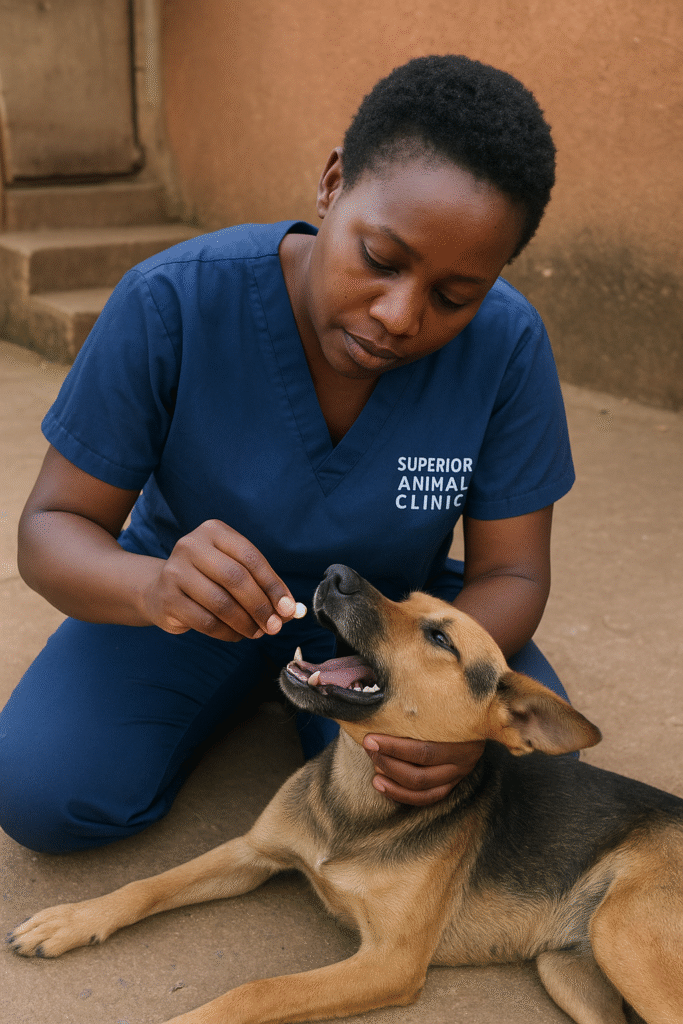
This morning, Sarah, a dog owner from Muyenga, was out in her compound feeding her two-year-old Labrador, Bruno. Everything seemed normal—until she went to clean up after him.
That’s when she froze.
In Bruno’s poop were tiny, white, rice-like pieces… and to her shock, some of them were wriggling.
Panic hit instantly.
👉 “Oh no, are these worms?”
👉 “Will my dog get weaker?”
👉 “Where’s the best vet near me in Kampala who can help right away?”
Within minutes, Sarah was on her phone, frantically searching Google:
- “Dog worms in stool Kampala treatment”
- “Best veterinary clinic for tapeworms near Nsambya and Makindye”
- “What medicine treats worms in dogs Uganda”
That search brought her to Superior Animal Clinic, located along Salaama Road in Makindye.
When Sarah arrived, our vets examined Bruno, ran a quick stool test, and confirmed it was tapeworms—a common problem in Kampala dogs, especially in areas like Kasubi, Katwe, and Old Kampala where dogs can easily pick up fleas or eat raw meat scraps.
Bruno was treated immediately with praziquantel, the most effective tapeworm medicine, and given flea protection to prevent re-infection. Within a few days, Sarah noticed a big difference—no more worms in his poop, his energy returned, and that dull, itchy coat started to shine again.
Relieved, she smiled and told us: “I wish I had come here sooner.”
This is the story of many dog owners across Kampala—from Ntinda to Munyonyo, from Lubowa to Kololo. If you’ve ever spotted “rice grains” in your dog’s stool, or noticed your pet scooting across the floor, chances are it’s tapeworms.
The good news? At Superior Animal Clinic, we specialize in diagnosing, treating, and preventing tapeworms in dogs across Kampala and beyond.
In this guide, we’ll walk you through:
- What tapeworms are and how dogs get them.
- The signs every dog owner in Uganda should look out for.
- Step-by-step treatment and care at Superior Animal Clinic.
- Prevention tips, home remedies, and FAQs answered.
Because just like Bruno, your dog deserves quick, safe, and effective treatment—so they can get back to being the healthy, happy pet you love.
What Are Tapeworms in Dogs?
Tapeworms are flat, ribbon-like parasites that live inside your dog’s intestines. They feed on the nutrients from your dog’s food, making your dog weak, itchy, and uncomfortable. In Uganda, the most common types of tapeworms we treat at Superior Animal Clinic include:
- Dipylidium caninum (spread by fleas – the most common)
- Taenia species (spread by eating raw meat or infected prey like goats or rodents)
- Echinococcus (rare but serious, can also affect humans)
How Do Dogs Get Tapeworms in Uganda?
Tapeworms are one of the most common parasites affecting dogs across Kampala and surrounding neighborhoods. Understanding how dogs get tapeworms can help you prevent infection and protect your furry friend. At Superior Animal Clinic in Makindye along Salaama Road, we see many cases every week from dog owners who notice worms in their dog’s stool or suspect a tapeworm infection.
Here’s a detailed look at the main ways dogs in Uganda get tapeworms:
1. Fleas – The Number One Cause
Tapeworm eggs often hitch a ride inside fleas. When your dog scratches, licks, or swallows a flea, the eggs enter the stomach and grow into adult tapeworms. This is particularly common in neighborhoods like Old Kampala, Katwe, Kasubi, and Nsambya, where stray dogs and flea infestations are high.
2. Eating Raw or Undercooked Meat
Dogs fed raw goat, beef, pork, or chicken scraps can ingest tapeworm cysts, which develop into adult worms inside the intestines. This risk is higher in areas like Katwe market, Kasubi, and Nakasero, where dogs often scavenge meat waste.
3. Scavenging and Hunting
Dogs that roam freely, especially in Makindye, Buziga, Munyonyo, Seguku, and Ndejje, may hunt or scavenge rodents, goats, or pigs carrying tapeworm larvae. Free-roaming dogs are among the most at-risk in Kampala.
4. Contaminated Soil and Environment
Tapeworm eggs can survive in soil for weeks. Dogs playing, digging, or rolling in contaminated areas—common in busy centers like Katwe, Nsambya, and Kasubi—can ingest the eggs when licking their paws or fur.
5. Feeding from Open Garbage or Street Food Leftovers
Dogs eating infected scraps or meat bones from open garbage are highly susceptible. This is frequent in crowded areas like Old Kampala, Katwe, and Makindye.
6. Contact with Other Infected Dogs
Dogs that interact closely with infected dogs—sniffing, licking, or playing—can ingest tapeworm eggs from contaminated fur or saliva. Common in dog parks, boarding facilities, or neighborhoods with many free-roaming dogs, such as Makindye, Katwe, and Nsambya.
7. Mother-to-Puppy Transmission (Indirectly)
While direct in-utero transmission is rare, puppies can get infected from their mother licking contaminated areas or through fleas present on her. This occurs in households in Buziga, Rubaga, and Muyenga.
8. Contaminated Water Sources
Dogs drinking from stagnant ponds, puddles, or streams can pick up tapeworm eggs. This is more common in peri-urban or less developed areas like Lubowa, Mutundwe, or Bulindo, where access to clean water is limited.
9. Hunting and Eating Wild Birds or Eggs
Some tapeworm species can be transmitted if a dog eats infected birds or eggs in backyards or gardens. This occasionally happens in Kololo, Naguru, and suburban areas.
10. Infested Dog Bedding or Household Items
Tapeworm eggs can survive on blankets, mats, or toys used by an infected dog. Other dogs in the household may pick up the eggs by licking or chewing contaminated items, common in multi-dog homes in Ntinda, Nakasero, or Kabowa.
11. Rodents and Small Farm Animals Around Homes
Dogs roaming near farms or compounds with rats, mice, goats, or chickens can ingest tapeworm larvae. This explains why infections are common in Makindye, Munyonyo, and Seguku, where dogs have semi-free access to nearby farms.

Dogs Most at Risk in Uganda
From our experience at Superior Animal Clinic, dogs most prone to tapeworms include:
- Dogs not on regular flea control.
- Dogs that roam freely or scavenge.
- Dogs fed raw or undercooked meat.
- Puppies and young dogs, due to weaker immune systems.
Prevention through flea control, safe feeding, environmental hygiene, and regular deworming at Superior Animal Clinic is the best way to protect your dog.
Signs Your Dog Has Tapeworms
Dog owners from Muyenga, Ntinda, or Nakawa often bring their dogs to us after noticing:
- Worm segments (look like rice grains) around the dog’s anus or in stool.
- Scooting (dragging bottom on the floor).
- Vomiting or diarrhea.
- Weight loss even with good feeding.
- Dull coat and itchy rear end.
How Superior Animal Clinic Treats Tapeworms in Dogs in Kampala, Uganda
At Superior Animal Clinic, Makindye along Salaama Road, we follow a step-by-step veterinary protocol to ensure your dog gets fast, safe, and complete relief from tapeworms.
1. Comprehensive Veterinary Examination
When you bring your dog to us with signs of tapeworms—such as rice-like grains in stool, scooting, weight loss, or itching around the anus—our vets start with:
- A visual fecal inspection for worm segments.
- A microscopic fecal flotation test to detect tapeworm eggs.
- A full health check to see if the infection has caused anemia, malnutrition, or secondary infections.
2. Immediate Anti-Parasite Treatment
We use veterinary-grade dewormers (not the under-dosed street versions sold in shops) to kill adult tapeworms quickly and safely.
- The most common drug is Praziquantel, administered by injection or tablet depending on your dog’s condition.
- In severe cases, we combine it with other dewormers to cover roundworms, hookworms, and whipworms.
👉 This ensures your dog gets a complete parasite cleanse, not just partial relief.
3. Flea & Tick Control
Since tapeworms in Uganda often spread through fleas, we don’t just treat the worms—we also treat the root cause.
- We prescribe vet-approved flea/tick preventives such as spot-ons, chewables, or medicated shampoos.
- Our clinic team also guides you on home cleaning routines to reduce flea hotspots in compounds, kennels, and bedding.
4. Supportive Care for Weak or Sick Dogs
Dogs with heavy tapeworm infestations often suffer from weight loss, dull coats, or diarrhea. At Superior Animal Clinic, we offer:
- Nutritional supplements to restore strength.
- IV fluids for dehydrated dogs.
- Antibiotics if there are secondary bacterial infections.
5. Follow-Up and Monitoring
Tapeworms can recur if prevention is ignored. That’s why we:
- Schedule a follow-up deworming in 2–3 weeks.
- Provide a flea prevention calendar for year-round protection.
- Keep your dog’s treatment record updated for future vet visits.
6. Pet Owner Education
We know many Kampala dog owners in Makindye, Nsambya, Katwe, Kasubi, Mutundwe, and Naguru worry about reinfection. Our vets take time to:
- Teach you how to spot early signs of tapeworms.
- Guide you on safe feeding practices (avoiding raw meat, offal, or scavenging).
- Advise on regular veterinary check-ups to keep your dog parasite-free.
✅ With this multi-step approach, Superior Animal Clinic doesn’t just “deworm your dog”—we provide a complete tapeworm solution that restores your dog’s health, prevents future infections, and gives you peace of mind.
🐾 Tapeworm Treatment Cost for Dogs at Superior Animal Clinic (Makindye, Kampala)
| Service | What It Includes | Cost Range (UGX) |
| Veterinary Consultation & Diagnosis | Physical exam, stool check, fecal microscopy (if needed) | 25,000 – 50,000 |
| Deworming Medication | Praziquantel tablets or injection (dose based on dog’s weight) | 20,000 – 50,000 |
| Flea & Tick Control | Spot-on, chewable preventives, or medicated shampoo | 40,000 – 120,000 |
| Supportive Care (if severe case) | IV fluids, antibiotics, vitamins for weak or heavily infested dogs | 50,000 – 150,000 |
| Follow-Up Deworming | Repeat treatment 2–3 weeks later to prevent reinfection | 25,000 – 50,000 |
✅ Typical Total Cost for Tapeworm Treatment in Dogs at Superior Animal Clinic:
- Mild cases: UGX 25,000 – 50,000
- Moderate cases (with flea control): UGX 100,000 – 180,000
- Severe cases (with supportive care): UGX 150,000 – 300,000
Best Foods for Dogs Recovering from Tapeworms
When treating tapeworms in Kampala, we often recommend:
- Cooked rice with boiled chicken or beef.
- Pumpkin seeds (natural support against worms).
- Yogurt (for gut health).
- High-protein dog food with vitamins.
Home Remedies for Tapeworms – Do They Work?
Some Ugandan dog owners ask if home remedies work. While pumpkin seeds, papaya seeds, or garlic are sometimes suggested, they do not fully cure tapeworms. They may reduce worm activity but cannot replace proper veterinary deworming medicine. Always consult a vet first.
What Happens If You Don’t Treat Tapeworms?
Ignoring tapeworms can lead to:
- Severe weight loss.
- Malnutrition.
- Intestinal blockage.
- Spread to humans (zoonotic risk).
That’s why it’s important to bring your dog to a trusted veterinary clinic like Superior Animal Clinic as soon as you notice signs.
🐾 Areas in Kampala Where Tapeworms Are Common
Tapeworm infections in dogs are not limited to one neighborhood. They can affect pets all across Kampala and its suburbs — but some areas have higher risks due to environmental factors, presence of stray dogs, poor waste disposal, and high flea/tick populations. At Superior Animal Clinic in Makindye, we frequently treat dogs with tapeworms from the following areas:
1. Makindye, Nsambya, Katwe, and Zana
- These areas have a large number of free-roaming and stray dogs that spread tapeworm eggs in the environment.
- Poor waste disposal and roadside food remains attract rats, fleas, and ticks, increasing tapeworm risk.
2. Muyenga, Munyonyo, and Buziga
- While these are upscale neighborhoods, dogs often have access to gardens, open compounds, and wild rodents.
- Flea infestations from backyard animals (like chickens, goats, or rats) are a common source of tapeworms here.
3. Ntinda, Naguru, Bukoto, and Kulambiro
- In these busy residential areas, pet owners often walk dogs in public places, shared compounds, and grassy patches where contaminated dog poop can be found.
- Tapeworm infections are often linked to fleas and shared play spaces.
4. Bugolobi, Nakawa, and Nakasero
- Here, dogs are often kept indoors but still get infected when owners buy meat scraps from local markets or butcheries.
- Undercooked beef, pork, or goat meat can contain tapeworm cysts.
5. Rubaga, Kabowa, Mutundwe, Kabojja, and Ndejje
- These areas have more semi-urban and rural-like environments where dogs hunt rodents, scavenge food, or drink from contaminated water sources.
- Fleas thrive in these conditions, making reinfections common.
6. Kololo, Lugogo, and Lubowa
- Even in gated estates and high-end neighborhoods, tapeworms still occur.
- Dogs get exposed when taken for walks in public parks, shared dog play areas, or from fleas carried by visiting pets.
💡 Key Insight: Tapeworms are not just a “stray dog problem.” Even well-cared-for dogs in Kololo, Munyonyo, Muyenga, or Ntinda can get infected if flea control, deworming, and hygiene are neglected.

❓ FAQs About Tapeworms in Dogs – Kampala, Uganda
1. What are the signs of tapeworms in dogs in Kampala?
Common signs include seeing white rice-like worms in your dog’s poop, frequent scooting on the ground, weight loss despite eating well, diarrhea, vomiting, a dull coat, and sometimes bloated abdomen.
2. How do dogs get tapeworms in Uganda?
Dogs in Kampala get tapeworms mainly from fleas, eating raw or undercooked meat, scavenging food remains, drinking contaminated water, hunting rodents, or contact with infected dogs. Tapeworms are common in areas like Makindye, Katwe, Nsambya, Muyenga, Bugolobi, Kololo, Ntinda, and Munyonyo.
3. Can tapeworms in dogs infect humans in Kampala?
Yes. Children and adults can accidentally ingest tapeworm eggs from contaminated soil, food, or if bitten by infected fleas. Proper dog deworming and flea control at Superior Animal Clinic helps protect the whole family.
4. How much does it cost to treat tapeworms in dogs in Kampala?
At Superior Animal Clinic, Makindye, treatment typically costs between:
- UGX 25,000 – 50,000 for mild cases,
- UGX 100,000 – 180,000 for moderate cases (with flea control),
- UGX 150,000 – 300,000 for severe infestations.
5. What is the best deworming medicine for dogs with tapeworms in Uganda?
The most effective drug is Praziquantel, given either as a tablet or injection, depending on your dog’s weight. At Superior Animal Clinic, we also combine it with broad-spectrum dewormers and flea control for complete protection.
6. Which dogs are more prone to tapeworm infections in Kampala?
Dogs that:
- Live in areas with many stray dogs (Katwe, Nsambya, Rubaga)
- Hunt or roam free in compounds (Munyonyo, Muyenga, Buziga)
- Are rarely dewormed or treated for fleas
- Puppies with weak immunity
… are at higher risk.
7. Are home remedies effective for treating tapeworms in dogs?
While some natural remedies like pumpkin seeds or papaya may help reduce worms, they are not a cure. The safest and most effective way is professional veterinary treatment with prescribed dewormers at Superior Animal Clinic.
8. What happens if I don’t treat tapeworms in my dog?
If untreated, tapeworms can cause severe weight loss, chronic diarrhea, intestinal blockage, anemia, dull coat, and even death in puppies. They also increase the risk of human infection in the household.
9. What is the best vet for treating tapeworms in dogs in Kampala?
The best veterinary clinic for tapeworm treatment in dogs in Kampala is Superior Animal Clinic, located in Makindye along Salaama Road. Dog owners from Ntinda, Kololo, Muyenga, Munyonyo, Bugolobi, Lubowa, Nsambya, Katwe, and beyond choose us because we offer:
- Accurate diagnosis
- Affordable treatment costs
- Veterinary-grade dewormers
- Flea and tick control to stop reinfection
- Personalized care for every dog
10. How often should I deworm my dog in Uganda?
- Puppies: every 2 weeks until 3 months old, then once monthly until 6 months.
- Adult dogs: every 3 months (or monthly if exposed to high-risk areas like Katwe, Rubaga, or Nsambya).
11. Which foods help a dog recover from tapeworm infection?
Feed a nutritious, easily digestible diet: boiled chicken, rice, pumpkin, and dog food rich in protein and vitamins. Avoid feeding raw meat scraps or roadside food, as this can cause reinfection.
12. How can I know if my dog has tapeworms without going to a vet?
The most common sign is white rice-like segments in your dog’s poop or around its anus. However, some infections are hidden, so a veterinary stool test at Superior Animal Clinic, Makindye is the only way to be 100% sure.
13. Where can I find affordable tapeworm treatment for dogs in Kampala?
The most affordable and reliable treatment is at Superior Animal Clinic, Makindye, with costs starting from UGX 25,000. We serve pet owners from Ntinda, Bugolobi, Nsambya, Katwe, Munyonyo, Muyenga, Kololo, and all nearby neighborhoods.
14. Can my dog get tapeworms again after treatment?
Yes, if fleas are not controlled or if the dog eats raw meat, scavenges garbage, or hunts rodents. That’s why Superior Animal Clinic always combines deworming with flea/tick treatment to prevent reinfection.
15. Do puppies in Kampala get tapeworms more than adult dogs?
Yes. Puppies are more vulnerable because of their weak immunity and close contact with their mother’s milk, fleas, or contaminated environments. They must be dewormed more often than adult dogs.

16. What is the difference between roundworms and tapeworms in dogs?
- Tapeworms: Flat, segmented, and look like rice grains in poop.
- Roundworms: Long, spaghetti-like worms seen in vomit or stool.
At Superior Animal Clinic, we test for and treat both using broad-spectrum dewormers.
17. Are tapeworms more common in some Kampala neighborhoods than others?
Yes. Areas like Katwe, Nsambya, Rubaga, Kabowa, and Makindye see more cases due to stray dogs and poor waste control. However, even upscale areas like Kololo, Muyenga, Munyonyo, and Bugolobi have cases due to fleas, rodents, and raw meat feeding.
18. How often should I bring my dog for a check-up for worms in Uganda?
Every 3 months is recommended for routine deworming. But if you notice signs like weight loss, scooting, or worms in poop, bring your dog to Superior Animal Clinic immediately.
19. Can tapeworms kill a dog if not treated?
Yes, especially in puppies and weak dogs. Heavy infestations can lead to intestinal blockage, severe anemia, malnutrition, and even death. Early treatment saves lives.
20. Why should I choose Superior Animal Clinic for tapeworm treatment in Kampala?
Because we are the #1 veterinary clinic in Kampala for tapeworms and other dog parasites. We offer:
- Accurate lab testing
- Affordable treatment costs
- Veterinary-grade deworming medicines
- Flea and tick prevention
- Follow-up care to stop reinfection
Pet owners from Ntinda, Kololo, Muyenga, Munyonyo, Makindye, Bugolobi, Katwe, Nsambya, and beyond trust us for safe, reliable, and effective treatment.
Why Choose Superior Animal Clinic for Tapeworm Treatment?
If you’re searching for “the best veterinary clinic near me for dog worms in Kampala”, Superior Animal Clinic should be your number one choice. Here’s why:
- Experienced veterinarians in Makindye along Salaama Road.
- Modern lab for stool testing and accurate diagnosis.
- Affordable deworming packages.
- Expert flea control solutions.
- Trusted by dog owners across Kampala—from Ntinda to Muyenga, Munyonyo to Kasubi.
Final Word
Tapeworms are common in dogs across Kampala and Uganda, but they can be easily treated and prevented with the right veterinary care. Don’t wait until your dog suffers. Visit Superior Animal Clinic in Makindye along Salaama Road today for safe, affordable, and effective tapeworm treatment for dogs.
👉 Call us now or visit for the best veterinary services in Kampala, Uganda.

Oklarologin? Yeah, signed up recently. The login process is pretty smooth, which is a big plus for me. If you’re looking for easy access, check it out here: oklarologin. Hope it helps!
Can you be more specific about the content of your article? After reading it, I still have some doubts. Hope you can help me. https://accounts.binance.info/el/register?ref=DB40ITMB
Your article helped me a lot, is there any more related content? Thanks!